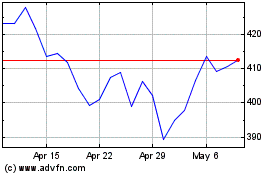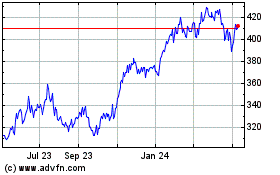By Natalia Drozdiak
This article is being republished as part of our daily
reproduction of WSJ.com articles that also appeared in the U.S.
print edition of The Wall Street Journal (January 19, 2018).
BRUSSELS -- European lawmakers and companies worry that a
lawsuit the U.S. government has brought to the Supreme Court could
clash with European Union law, trapping tech companies between
complying with U.S. data requests and strict EU data-privacy
rules.
The case, set to be heard next month, stems from a dispute
between the Justice Department and Microsoft Corp. over access to
emails stored on a server in Ireland. Industry officials say it
highlights the stark differences between the U.S. and Europe over
views on online privacy and the extent of government access to
users' data.
The U.S. government in 2013 obtained a search warrant requiring
Redmond, Wash.-based Microsoft to hand over email information as
part of an investigation into a customer who allegedly was using
the account to conduct criminal drug activity.
Microsoft complied with part of the order but rebuffed the
request to turn over the email messages, which were stored abroad,
arguing that U.S. search warrants don't reach data stored outside
domestic borders. Microsoft argues that complying with the warrant
would have meant the company could have run afoul of EU privacy
rules.
At issue in the court case are broader questions about who
should govern global internet companies, and how. In particular,
cloud computing companies, such as Microsoft or Amazon.com Inc.,
can move data among different servers around the world.
Microsoft says it stores users' data in the region where a user
resides and customers should be in control of their data.
The U.S. argues that its warrant required Microsoft to hand over
the information because it can be accessed in the U.S. with the
click of a computer mouse, and lack of access to that data could
pose significant barriers to ongoing investigations.
"Hundreds if not thousands of investigations of crimes --
ranging from terrorism, to child pornography, to fraud -- are being
or will be hampered by the government's inability to obtain
electronic evidence," the Justice Department said in a court
brief.
A U.S. government win in the case could hand U.S. companies
operating in Europe an expensive dilemma: either comply with U.S.
data requests or risk breaching EU data privacy rules. European
companies with business operations in the U.S. also fear they could
receive similar requests from American authorities sent to their
headquarters abroad.
"This untenable position would throw a wrench into the countless
routine business arrangements that comprise today's highly
interdependent commercial world," the largest trade organizations
from Germany, Ireland, Poland and France said in a joint filing to
the court.
Foreign governments can access evidence in Europe for criminal
investigations, but the preferred method under EU law is to go
directly through member states, as part of what is known as a
Mutual Legal Assistance Treaty. That approach will be enshrined in
the bloc's new data protection regulation, to enter into force in
May. The new rules threaten fines as high as 4% of a firm's global
revenue for failure to comply.
Washington's position seems to fly in the face of EU
sovereignty, some European officials and legal experts said.
"This can clearly escalate to being a conflict of law and
international relations," said Jan Philipp Albrecht, a Green Party
member of the European Parliament and staunch privacy advocate.
"The question [is] if the EU can expect that their own laws apply
to their own territory and market or is the U.S. trying to put that
into question?"
Companies, governments and institutions in Europe and elsewhere
have submitted third-party briefs to the court ahead of the
hearing, which is set for February 27. A decision is expected by
June.
The U.K., one of the U.S.'s closest law-enforcement allies in
Europe, has thrown its weight behind Washington's arguments in the
case. Britain, which is preparing to exit the EU, is also currently
negotiating a bilateral treaty with the U.S. over access for
law-enforcement purposes to electronic communications held on
servers in each other's jurisdictions.
The case is reminding some Europeans of leaks by one-time
National Security Agency contractor Edward Snowden disclosing that
U.S. tech companies cooperated with the NSA, allowing authorities
to access information through a so-called backdoor. Those
revelations sowed deep mistrust in Europe of U.S. intelligence
practices, straining trans-Atlantic ties and hindering cooperation
between Washington and Brussels in other areas.
U.S. tech companies also came under scrutiny from the broader
public following the revelations. That is one reason Microsoft is
fighting so hard: to maintain its reputation. Microsoft says it has
only provided data to the U.S. government under valid legal
orders.
"Pre-Snowden, this would have been done quietly, there would
have been an accommodation" between Microsoft and the government,
said James A. Lewis, a senior vice president at the Center for
Strategic & International Studies, a Washington-based think
tank. "Everyone would have gone away happy."
Now, "they need to show the world, their global customer base,
that they're not just going to roll over every time the U.S.
government asks them for something," he said.
Write to Natalia Drozdiak at natalia.drozdiak@wsj.com
(END) Dow Jones Newswires
January 19, 2018 02:47 ET (07:47 GMT)
Copyright (c) 2018 Dow Jones & Company, Inc.
Microsoft (NASDAQ:MSFT)
Historical Stock Chart
From Mar 2024 to Apr 2024

Microsoft (NASDAQ:MSFT)
Historical Stock Chart
From Apr 2023 to Apr 2024
